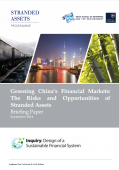This Synthesis Report is based on an 18-month project, Greening China’s Financial System, carried out by the International Institute for Sustainable Development (IISD) and the Finance Research Institute (FRI), Development Research Center (DRC) of the State Council, in association with the United Nations Environment Programme (UNEP) Inquiry into the Design of a Sustainable Financial System, and with support from the Fridtjof Nansen Institute. The aim is to develop specific proposals for greening China’s financial system, based on an analysis of current practice in China and an exchange of experience with international experts.

Over the course of the last two decades, the issues surrounding technological innovation, investor behaviour, and business resilience have become magnified in the context of environmental change. This has helped to bring forward the issue of stranded assets as a sustainability concern beyond regulatory action on competition policy. This paper, produced to help inform an International Institute for Sustainable Development (IISD) and UNEP Inquiry collaboration with policymakers in China, examines the risks and opportunities associated with stranded assets, provides five international case studies, and identifies how these issues might be relevant to Chinese policy makers.
